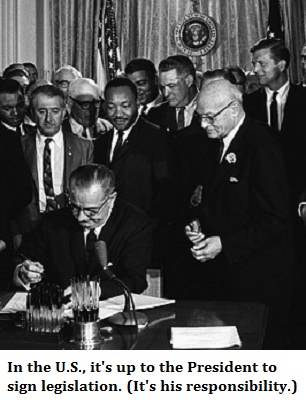Phrasal Verb Use
A phrasal verb is a verb used with a particle* (preposition) such as ‘at,’ ‘in,’ ‘out,’ or ‘up.’ Phrasal verbs are also called multi-word verbs, two- (or three)-word verbs, or verb phrases.
 "Look it up in the dictionary."
"Look it up in the dictionary."Phrasal Verbs are used constantly in casual conversation. Here's an example: "Did you find out what the boss wants?" "Not yet. He said he's looking for some kind of strange-named electronic gadget to impress his visitors. He needs it before they show up next week. I'll call up my friend in engineering and ask him to look it up. He's good at coming up with quick fixes."
Not all phrasal verbs are idioms. Many have meanings that are quite obvious. In fact, some can be used with or without the particle (in cases where it just emphasizes the action of the verb) Examples are ‘clean’ or ‘clean up,’ ‘call someone’ or ‘call her up,’ ‘wash the dishes’ or ‘wash them up.’
Other times, however, the meaning of the verb is different with a particle/preposition added. Some verbs may be used with several prepositions, each with a different meaning. Those are the verbs discussed on the rest of this page, as well as in the phrasal verb lists linked at the end of this page.
For the Curious
Here's a grammar explanation for particles and phrasal verbs. You can skip this if you want. However, it might help if you wonder why we use two-part verbs so often when a single verb would work.
*The particles in phrasal verbs are words that are also used as prepositions. They are not used as prepositions in verb phrases, though. Instead, the particle acts as a part of the verb. The verb and particle together have one meaning, that can often also be expressed by a single verb.
For example, we could say 'enter' instead of 'get in', 'arrive' instead of 'show up', 'yield' instead of 'give up.' However, many English-speakers like the casual feel of common phrasal verbs. We use some of them much more often than single verbs like 'arrive,' 'enter,' or 'yield' that seem more formal to us.
Examples: Changing the Particle
Changes
the Meaning
- Think about (it)’-- consider an idea.
- ‘Think of’-- get an idea or remember something: “I can’t think of her name right now, but I’ll remember it in a minute.”
- ‘Think on’ is very rare, though it is used in some old literature. We don’t say ‘think in’ in English, although that is the way to express ‘think about’ in Spanish. (Often there’s no obvious reason why we use one particle instead of another-- you just have to learn them!)
- ‘Think (it) over’-- like ‘think about,’ but separable. See the discussion below.
- ‘Think up’-- to get (“come up with”) a new idea. (“My mom is an expert at thinking up ways to keep me busy.”)
To see other examples using different particles with 'think' (as well as with take and other verbs), see List of Phrasal Verbs-2. For other common phrasals, see the lists at the bottom of this page.
Separable & Inseparable Phrasals
If you want to use (not just understand) phrasal verbs, there is also a grammar point to learn. We use verb phrases in two ways. Some are separable: we can put a noun or pronoun between the verb and its particle.
For example, a mother wakes up her son, or she wakes her son up. For separable phrasals, if you use a pronoun it MUST go between the verb and particle: "She wakes him up." We never say ‘the mother wakes up him.’
Other multi-word verbs are inseparable. We cannot put anything between the verb and its particle. Dan takes after his father— or Dan takes after him. In English we cannot say ‘Dan takes him after’!
Any three (or more) word verb phrase will be inseparable. You need to learn if any two-word phrase you want to use is separable or not. There is a way to avoid this problem: do not separate verb and particle, and use a noun, not a pronoun, after the phrase. Verb+ particle+ noun is always acceptable.
Verb + Up Meaning to Rise or Increase:
One very common phrasal verb pattern is a verb + up. Here are two cases that simply combine a verb with 'up' to show the direction of movement.
- To go up means to increase (often used for prices).
- To turn up means to increase the volume or the heat/flame on a stove.
‘Up’ as an Intensifier
'Up' can also act as an intensifier, emphasizing the verb's action.
- For example, to stand up usually just means to stand (get onto your feet-- from a sitting position most often.)
- To clean up does not mean to clean in an upward direction, but to clean well. It includes removing dirt plus the idea of picking up things that are out of place and putting them back where they belong.
- To clear up is also to clear the floor, counters, etc. by picking up whatever belongs elsewhere. It has another use as a metaphor for making an idea clear. “Please explain what happened so we can clear up the mystery about last night’s party.”
- To call someone up means to call that person on a telephone. (It can also mean a call into military service.)
- To cut something up is to cut it into pieces. (To cut up can also mean to act silly.)
- To fill up is to fill. At a gas station, “fill ‘er up” means to fill the car’s gas tank with gasoline.
- To wake up is to awaken— become fully conscious after sleeping.
Verb + ‘Up’: Idioms

Sometimes ‘up’ does change the meaning of the verb it follows.
- For example, ‘to be up’ means that a person has gotten up from his bed (or chair, or the ground): "I've been up since 4 A.M. I couldn't sleep."
- ‘To be up to someone’ means that something is their responsibility.
- However, ‘to be up to something’ means to have a plan in mind. Often that plan is hidden and the speaker suspects it's undesirable. (“Watch out for Joey. He’s always up to something. Last week he locked his teacher out of her classroom!”) “What have you been up to lately?” means 'what have you been doing?'
- To be fed up with someone or something is to be angry or have lost patience with them.
- To mess up is to make a mistake or cause a problem. “Don’t mess up on this project, Joe! Your carelessness has already cost our company a lot of money. If you mess up one more time, you’re fired!”
More Phrasal Verbs to Study & Practice
See List of English Phrasal Verbs, A-M for to blow up, give up, hang up, hook up, look up, look up to someone, and make up. (It also lists phrasal verbs with other particles).
See List of Phrasal Verbs, P-W for pick up, put up with, and show up, think up, turn up, use up, and wake up , as well as other phrasal verbs.
If you'd like to download a free alphabetical list of the most common phrasal verbs with example sentences and practice, see Common Phrasal Verbs. It's helpful for the explanations and practice, but also as a reference. Use it when you hear a phrasal verb that's hard to figure out (since some meanings are not obvious!)
See List of Idioms for more detail on to be up to someone, as well as catch up (and many idioms not usng 'up.')
Idiom Examples demonstrates many phrasal verbs and other idioms as they are used in conversations. You can practice phrasal verbs with two memory (Concentration) games: Memory Game 1 (for Phrasal Verbs A-L) and Memory Game 2 (M-Z) or with the Phrasal Verbs Quiz.
For ESL teachers: I've combined the phrasal verb information from this page & the pages above into a seven-lesson, $6.50 pdf for ESL classes. It includes new practice activities and extra memory game cards.
It's a great way to give your students extensive practice using nearly 100 of the most common phrasal verbs. See Phrasal Verbs: Classroom Practice if you're interested.
Home > Common Idioms > Phrasal Verb Use.
Didn't find what you
needed? Explain what you want in the search box below.
(For example, cognates, past tense practice, or 'get along with.') Click to see the related pages on EnglishHints.
| site search by freefind | advanced |







New! Comments
What do you think about what you just read? Leave me a comment in the box below.